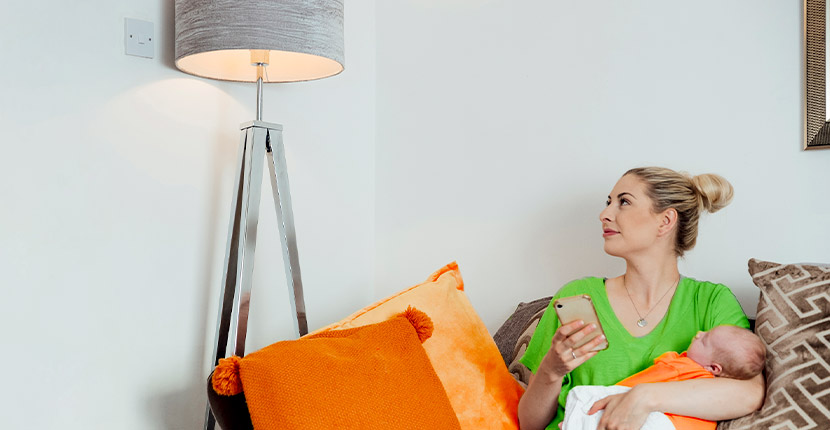How Does a Wi-Fi Light Bulb Work?
- by Bryan Veldboom - updated on 3/16/2022

According to a recent study, 69% of U.S. households have at least one type of smart device in their homes. One of the most commonly used Smart Home products are Wi-Fi light bulbs. Wi-Fi light bulbs, otherwise known as smart bulbs, allow you to control your lights remotely via the internet while providing you with a number of additional features. Today, we'll be answering some of your most commonly asked questions regarding Wi-Fi bulbs and how they work.
What are Wi-Fi Light Bulbs?
As mentioned above, Wi-Fi light bulbs use wireless technology to provide you with remote access to your lights. That means no more worrying about whether you left the lights on when you left for work. Just turn your Wi-Fi bulbs on and off remotely using an easy-to-use app on your phone. You can also create customized lighting schedules or set them up to function as motion sensor lights. Plus, they feature voice control capabilities through Amazon Alexa or Google Assistant.
But that's not all. Many Wi-Fi bulbs also feature additional features, such as the ability to dim or brighten bulbs and change the color of your lighting. This allows you to customize your lighting to fit a particular mood.
How Do You Connect a Wireless Light Bulb?
Batteries Plus sells Wi-Fi light bulbs from Geeni. These smart bulbs are incredibly easy to use and don't require the use of a hub. Simply download the Geeni app and create an account. After that, you can choose exactly which product you are trying to connect to and the app will provide you with a set of step-by-step instructions on how to connect your Geeni smart bulbs.
Do Wi-Fi Light Bulbs Use Bandwidth?
Your internet bandwidth is impacted by the number of devices connected to it. If you have too many things connected to your network, you may notice a drop in the speed of your internet service. One thing to keep in mind though is that a Wi-Fi bulb only connects to your Wi-Fi router when you're instructing it to do something. As long as your Wi-Fi bulbs aren't being used, they won't use any bandwidth.
How Long Do Wi-Fi Light Bulbs Last?
Most smart light bulbs have an average lifespan of around 20,000 hours, although some can last as long as 25,000 hours. So what does that mean in terms of years? If you use a smart bulb for three hours a day, it should last roughly 22 years. Your individual results will vary based on the bulb manufacturer, type and how often you use your light bulbs per day.
Do Wi-Fi Light Bulbs Work Without Internet?
If your Wi-Fi connection goes out, you won't be able to control them remotely or take advantage of other online features, such as color-changing or dimming. Your Geeni smart bulbs will continue to function like a normal light bulb, however, and can be controlled using an ordinary lamp or light switch.
Do Wi-Fi Bulbs Work in Any Fixture?
There are two things to consider when using a smart bulb in a fixture: space and the bulb's base. Make sure there's enough space in the fixture to safely accommodate the bulb so that the bulb's globe isn't touching any part of the fixture. Second, be sure that the bulb's base matches the fixture's socket. Most smart bulbs are screw base bulbs, which are accepted by the majority of lighting fixtures.
Where Do You Start When Setting Up a Smart Home?
Wi-Fi bulbs are a great way to try out smart products in your home without a big commitment. They're inexpensive, easy-to-use and don't require you to have a home hub. Plus, if you find that you like them, you can add more at any time.
Visit Batteries Plus for Your Home Automation Needs
Batteries Plus is your source for Wi-Fi bulbs and other Smart Home products. Browse our selection of Smart Plugs, Smart Devices and Smart Security solutions. Want to learn more about home automation? Read about "How to Use Smart Devices to Get Your Home Ready for Winter." Want to learn more about lighting? Check out our Lighting Purchasing Guide or read our blog entitled "Lighting Tips that are Easy on the Eye."